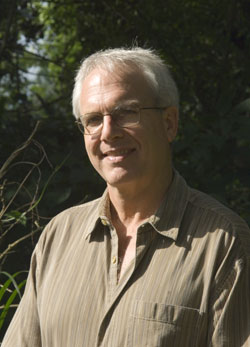Emerging threats to rainforests
Rainforests face array of emerging threats
Rhett Butler, mongabay.com
June 15, 2008
Tropical forests face a number of emerging threats said a leading biologist speaking at a scientific conference in Paramaribo, Suriname.
William F. Laurance, a researcher at the Smithsonian Tropical Research Center (STRI), told the annual meeting of the Association for Tropical Biology and Conservation (ATBC) that industrial drivers of deforestation have grown substantially in the past two decades fueled by rising consumption, globalization, and other macroeconomic forces. Poor farmers account for an ever-decreasing proportion of land-clearing in the tropics.
Using the Brazilian Amazon as an example, Laurance said the expansion of large-scale cattle ranches and industrial soy farms — a response to high commodity prices and improved financial stability in Brazil — is providing an economic impetus for road-building and other infrastructure projects that promote land speculation, colonization, logging, and further agricultural expansion. He noted that the per-capita deforestation has “accelerated sharply” in the region in recent years and that industrial drivers of forest conversion will increase as global output expands three- to six-fold by 2050.

Laurance is also co-editor of Emerging Threats to Tropical Forests. Released on October 1, 2006, the book chronicles the threat facing the world’s most biodiverse ecosystems. |
Laurance said China’s emergence as an economic superpower is further impacting tropical forest cover in the tropics through demand for raw materials. For example, Laurance cited figures showing that half of all the timber shipped anywhere in the world goes to China. Most of this timber is in the form of raw uncut logs, making it tough for tropical countries to build industries based on value-added products. China then converts this wood into furniture which is shipped to markets abroad. Laurance said that China isn’t particularly concerned whether timber is harvested legally or sustainably.
Laurance also highlighted other emerging threats to tropical forests including the explosive growth of biofuels, which exacerbate agricultural pressure on forest lands for palm oil, soy, and sugar cane; rapid population growth in developing countries; emerging pathogens like the Chytrid disease that has wiped out amphibian populations around the world; climate and atmospheric changes which especially threaten thermal and elevational specialist species; and environmental synergisms like the interaction between fragmentation and fire in the Amazon and links between hunting and logging in Central Africa.
Laurance concluded by discussing several key research challenges for scientists working on tropical forest issues. How will a massive loss of old-growth forests affect tropical biodiversity? Are undisturbed forests a carbon sink or source? How will climate affect tropical forests? Can carbon-trading promote large-scale forest conservation? And what “unknowns unknowns” are lurking out there?
Laurance said that despite the array of threats he is optimistic that global forest loss can be slowed. He urged scientists to keep informed on the changes occurring in tropical forests.
Related
An interview with tropical biologist William F. Laurance October 16, 2006
The world’s tropical rainforests are in trouble. Spurred by a global commodities boom and continuing poverty in some of the world’s poorest regions, deforestation rates have increased since the close of the 1990s. The usual threats to forests — agricultural conversion, wildlife poaching, uncontrolled logging, and road construction — could soon be rivaled, and even exceeded, by climate change and rising levels of carbon dioxide in the atmosphere. Understanding these threats is key to preserving forests and their ecological services for current and future generations. William F. Laurance, a distinguished scholar and president of the Association for Tropical Biology and Conservation (ATBC) — the world’s largest scientific organization dedicated to the study and conservation of tropical ecosystems, is at the forefront of this effort. Laurance, who as a senior staff scientist at the Smithsonian Tropical Research Institute has spent years studying the ecological impacts of habitat fragmentation and degradation in tropical forests, is actively involved in conservation efforts and development policy in the Amazon and central Africa. In this capacity, Laurance recently advocated an innovative strategy to compensate developing countries for conserving their rainforests while helping fight global climate change.
U.S. corn subsidies drive Amazon destruction December 13, 2007
U.S. corn subsidies for ethanol production are contributing to deforestation of the Amazon rainforest, reports a tropical forest scientist writing in this week’s issue of the journal Science. Dr. William Laurance, of the Smithsonian Tropical Research Institute in Panama, says that a recent spike in Amazonian forest fires may be linked to U.S. subsidies that promote American corn production for ethanol over soy production. The shift from soy to corn has led to a near doubling in soy prices during the past 14 months. High prices are, in turn, driving conversion of rainforest and savanna in Brazil for soy expansion.
Rainforest logging threatens endangered sea turtles February 25, 2008
Logging is having an unexpected impact on endangered sea turtles in Central Africa, reports a new study published in Oryx.
Aerial surveys in Gabon reveal that logs lost during transport are clogging beaches, preventing critically endangered leatherback turtles (Dermochelys coriacea) from nesting.














